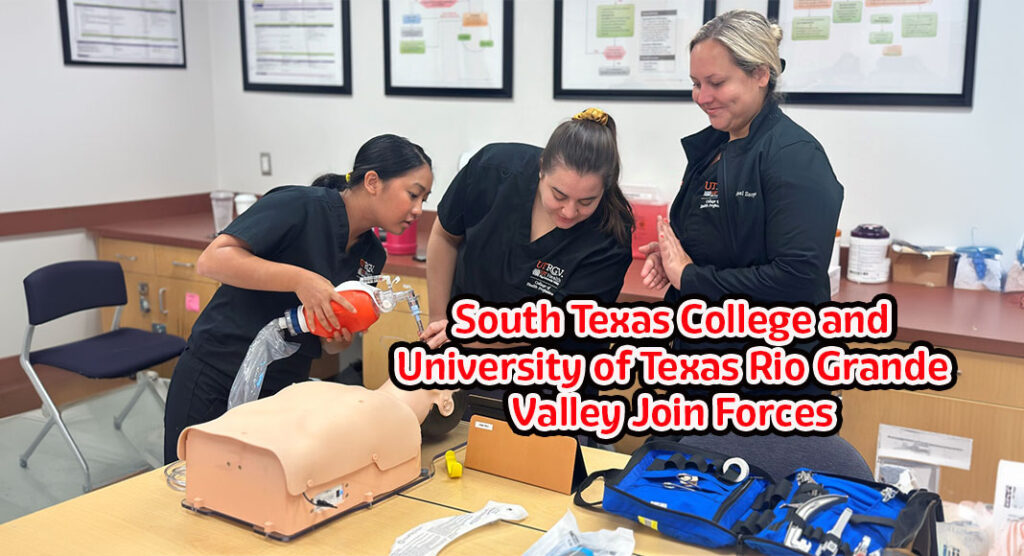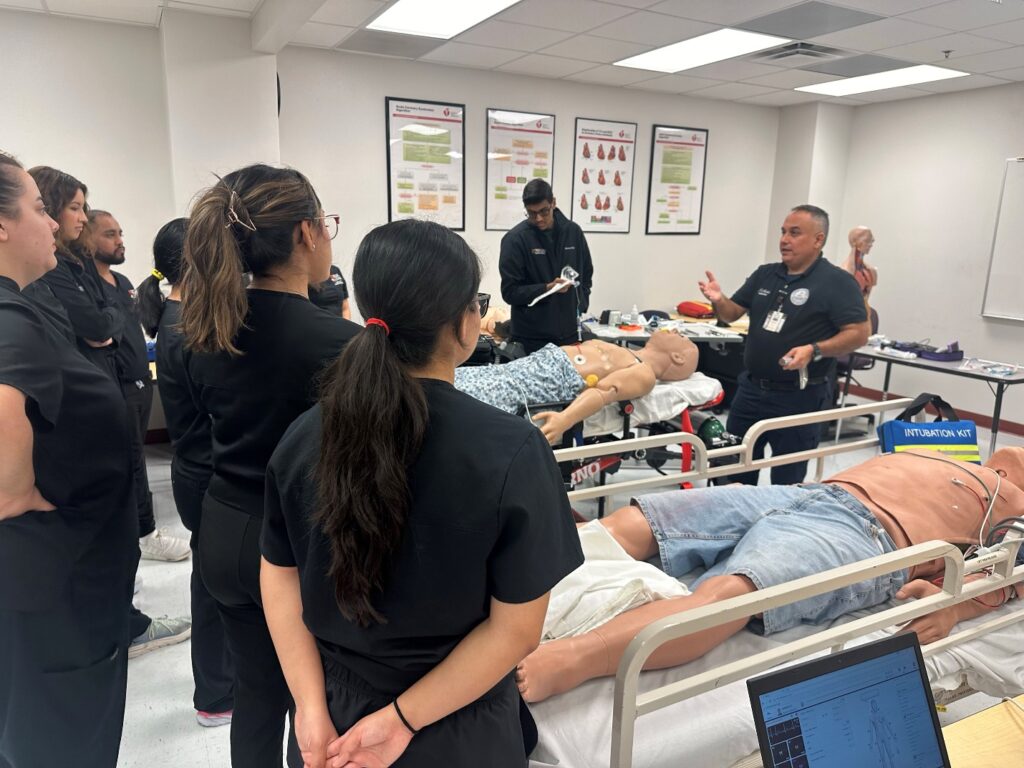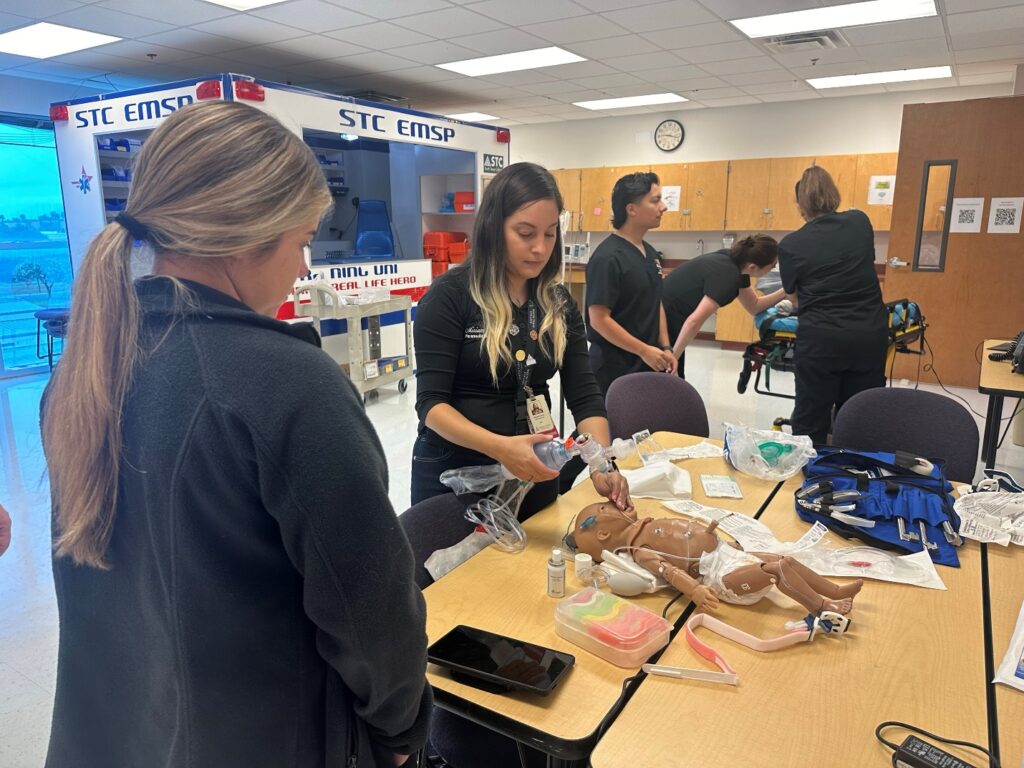
Texas Border Business
Selene Rodriguez
South Texas College and The University of Texas Rio Grande Valley recently celebrated a significant milestone in their long-standing partnership by organizing an advanced training session that brought together UTRGV Physician Assistant students and faculty from STC’s Emergency Medical Services program.
More than 80 UTRGV graduate students gathered at STC’s Nursing and Allied Health campus for an Advanced Airway Workshop, where they engaged in hands-on training with the college’s state-of-the-art simulation equipment.
“At STC, we are committed to providing our students with everything they need to succeed. That’s why we continuously advance and update our resources, staying current with technology,” said STC Emergency Medical Services Program Chair Carlos Tello. “These resources include a comprehensive range of disposable supplies and various types of simulation equipment, including full-body and partial medical manikins. Specifically, for this advanced training, UTRGV students had the opportunity to use our state-of-the-art camera intubation devices.”

Guided by STC instructors and South Texas Health System Emergency Medicine and Critical Care Specialist Dr. Michael Menowsky, the UTRGV graduate students had the opportunity to apply their airway management knowledge on both adult and pediatric high-fidelity medical manikins, preparing them for real-world scenarios.
“There are situations where a patient needs to be intubated, and the equipment required can vary in size depending on whether you’re dealing with a child, male or female. It’s a highly skilled task that must be completed within a 30-second time frame, so a systematic approach is essential,” explained UTRGV Clinical Assistant Professor Dr. Nathalie Chacon. “Practice is key, and we’re very grateful to STC for allowing us to use their equipment. While we have manikins at our school, none can move and react like those at STC. They always have the best of the best.”
For Jacqueline Flores, a second-year student in the UTRGV Physician Assistant program, this experience has significantly boosted her confidence as she prepares for her clinical rotation next month.
“We’ve just finished learning about airway management, and it’s amazing that we could come here and put it into practice,” she said. “We have technology and labs, but what we experienced here is on a whole different level. Especially for pediatrics, we don’t have as much variety as they do. Intubating an adult is very different from intubating a child, so this practice was incredibly valuable.”
Flores shared her excitement about returning to STC after completing prerequisite classes years ago, which helped her enter the Physician Assistant program.

“I completed my undergraduate studies out of town and didn’t want to move away again, so I’m grateful that STC allowed me to complete my prerequisites at home and transfer,” she said. “Seeing all the resources available here, I’m thankful they shared them with us and provided valuable practice. I believe this will make us better providers.”
This event underscores the achievements of a 15-year partnership between the two health programs, in which, for many of those years, STC’s Emergency Medical Technician and Paramedic students have been welcomed at UTRGV’s cadaver lab, providing them with an in-depth understanding of human body functions and a hands-on resource to explore anatomical structures.
“While we provide the theoretical knowledge, seeing everything in real time with such clarity helps our students connect the dots of the structures we study,” said Tello. “This partnership has opened doors that were previously closed, allowing us to expose them to essential resources. Health care is crucial, and we want to ensure people are aware of all available resources, encouraging more individuals to enter the medical field.”
Chacon shared her enthusiasm for continuing the ongoing partnership through the Pre-Physician Assistant Society at UTRGV, where students often pursue STC’s programs as a pathway to gaining admission to the physician assistant program in the future.
“We’re proud to work with STC for the future of our community,” said Chacon. “Ultimately, we are all part of South Texas. While we each have our own resources, coming together enhances the future of health care.”
For more information on STC’s Emergency Medical Services or other Nursing and Allied Health programs, visit nah.southtexascollege.edu or call 956-872-3100.


